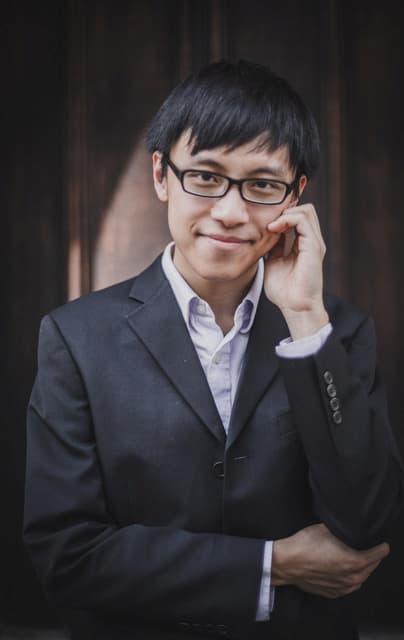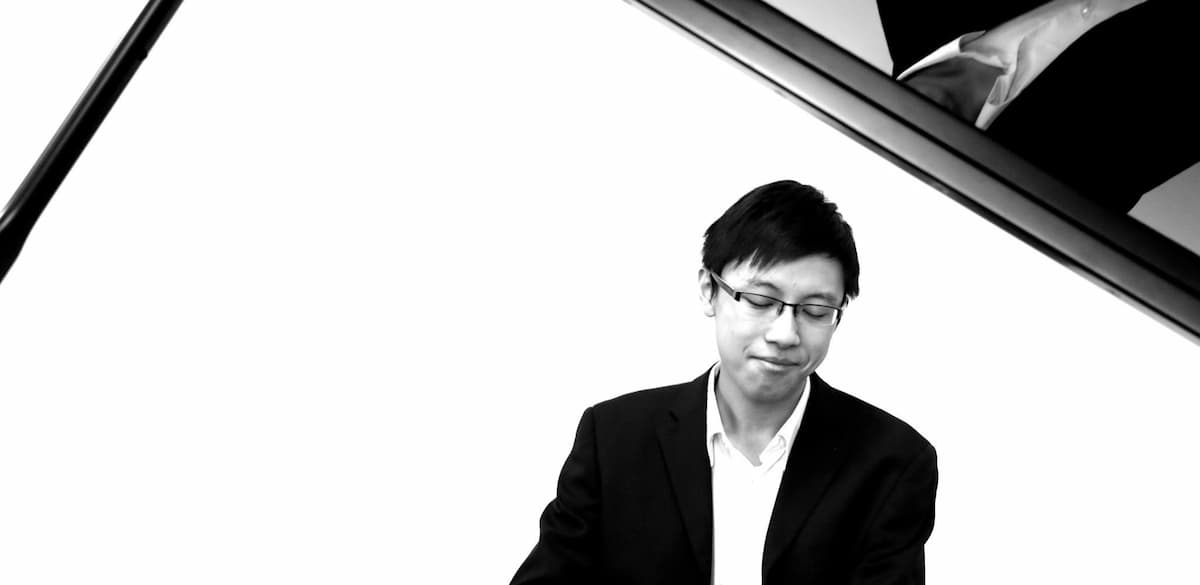Meet Dr. Jimmy Cheung, a pianist and educator who was born in Hong Kong but currently resides in the United States. He is also a double bass player. He recently graduated from the University of Cincinnati College-Conservatory of Music (CCM). Jimmy began participating in piano competitions when he was only 9 years old. In this interview, he shares with us his experience of playing in piano competitions, his studies in different places, and his passion for educating younger pianists.
Cesar Franck: Prelude, Chorale and Fugue FWV 21
Hi Jimmy. Would you like to tell us about yourself?

Chi Hoi Jimmy Cheung
Sure! My name is Jimmy Cheung, I am a pianist and educator. I currently reside in San Antonio, Texas, where I work as a Piano Instructor at the Musical Arts Center of San Antonio (MACSA). Outside of my main job, I am also a Collaborative Pianist at the University of Texas at San Antonio and an Organist at Covenant Presbyterian Church here in town. I am originally from Hong Kong. At the age of 18, I won a scholarship to study at the Royal College of Music in London, where I remained for six years. After that, I moved to the States and completed my terminal degrees at the University of Cincinnati College-Conservatory of Music (CCM). Also, not many people know this, but I also play the double bass and am a lifelong German bow player (sorry French bow!)
You have participated and won many prizes in competitions. Do you still remember your very first competition? Did you enjoy it? Why or why not?
Sergei Prokofiev: Piano Sonata No. 6 in A major, Op. 82
Yes, I do! I still remember the repertoire. It was Mozart’s Minuet in G major. I was told it is one of the very first pieces Mozart had composed when he was five. As for the enjoyment, I think I did! I must have been about nine at that time. I am not even sure if I knew it was a competition. I remember my teacher signed me up for this “recital,” where I had to memorize this piece written by a five-year-old and played on the “big piano” in the Hong Kong City Hall. Yes, the concert grand piano felt massive to me! I remembered dressing up in this slightly uncomfortable tuxedo, the warmth from the big stage light, and the enthusiastic response from the audience. It is still an experience that I treasure these days. Although it did not make me a pianist overnight, it has certainly planted a seed of music being a huge part of my life.
Tell us one or two competition experiences that have impacted your life/playing.
Percy Grainger: Fantasy on Themes from Gershwin’s Porgy and Bess
(Duo Orchid-Primo: Pui Yee Angela Lau Secondo: Chi Hoi Jimmy Cheung)
I would say the recent Ohio International Piano Duet & Duo Competition is a memorable one. I have participated in many competitions before, including chamber music competitions. However, this is the first competition I have participated in that focuses on piano four-hand and two-piano literature. I will admit I used not to entertain the idea of sharing the keyboard or performing two-piano works. I always want my own space on the keyboard, and I feel like two-piano sounds too much the same. At that time, my fiancée Angela (now wife) and I were preparing for our degree recitals. We remembered listening to some truly remarkable two-piano performances by our mentors, Soyeon Kate Lee and Ran Dank, at the Bowdoin Music Festival which we both attended as a scholar. We decided to give it a shot and started reading some music from the library. A few months later, Duo Orchid was formed, and we were very lucky to be the first prize winner in the Ohio International Piano Duet & Duo Competition. I am glad to report that Duo Orchid is still performing and rehearsing today despite our busy schedules. The experience from this competition has changed my view about the art of four-hand and two-piano playing. It also leads to the discovery of many underrepresented composers, including Cecil Chaminade and Hwang Ch’uqi, to name a few. From a personal standpoint, the whole process changed my perspective about rehearsing with a loved one, which many people claim is impossible.
You had studied music in Hong Kong, England, and the United States. Could you tell us the different atmospheres you had experienced studying in these three places?
Isaac Albeniz: Triana
I am blessed to have the opportunity to receive music education in three very fine places. It puts me in a unique position, where I can utilize the knowledge, skills, and experience I gained from these very different but equally excellent education systems. In my pre-college days, I studied at the Junior Music Program of the Hong Kong Academy for Performing Arts. It is one of the most comprehensive programs of music instruction for talented young people in Hong Kong. Lessons and classes were intense, focused, and demanding. Here, I learned the discipline and hard work one must put in to become a professional musician. When I moved to London, it was a different story. Classes at the Royal College of Music are sporadic. Students are given lots of free time for personal and professional development. However, the standards and expectations are extremely high. Being able to self-motivate, stay focused, and have clear goals are musts in the British conservatory system. London has some of the world’s best classical music scene, and it is up to the individual to take advantage of it. Finally, life as a music student in the United States pushed me both musically and academically. The Doctor of Musical Arts degree program at CCM is very demanding, both in terms of performance and academic requirement. It is also during my time at the conservatory that I learned how to be a well-rounded musician, which includes the ability to be entrepreneurial, build relationships, collaborate, etc.
As a music educator, what would you like to bring to your students?

© Chi Hoi Jimmy Cheung
I had the honor and privilege to study with some of the world’s greatest pedagogues, artists, and performers. Now that I am a music educator myself, I would like to continue the tradition of excellence. I teach a diverse group of students at MACSA. I hope that they will benefit from my knowledge and expertise. I strive to help every student achieve their full potential by fostering a growth mindset and creating manageable goals. Performing is a big part of music learning. I would like to utilize my experience as an active performer to help my students overcome the challenges associated with it and enjoy the satisfaction from it. I organize group classes periodically for my students. They provide a safe and open space for students to practice performance and develop critical thinking skills. I am always looking out for my students. Being a part of MACSA and the San Antonio music community allows me access to many unique opportunities, which I strongly encourage my students to take advantage of.
Do you have any performances/presentations coming up that you would like to share?
Cécile Chaminade: 6 Pieces Romantiques op. 55
Yes! Since moving to the San Antonio area, things have started to pick up. I would like to share with you a couple of events that are happening soon. In February, I will be giving my Texas debut with a solo recital and a masterclass at MACSA. My program features some “hidden gems” by well-known composers, including Granados’ Valses Poetico and Chopin’s Rondo in E-flat major. I am planning to bring this program to other venues in the South Texas area in the next few months. In the masterclass that is open to the public, I will be working with intermediate to advanced-level students. This is part of the MACSA Masterclass Series that we started doing this spring to strengthen student’s performance skills. In late February, I will be speaking at the Career Day at Sky Harbor Elementary School to talk about the career trajectory of a professional musician. Duo Orchid is also preparing a new program! We would like to perform more music by Hong Kong composers, and we are in the process of reaching out to them.
To learn about Jimmy, please visit his website.
For more of the best in classical music, sign up for our E-Newsletter




